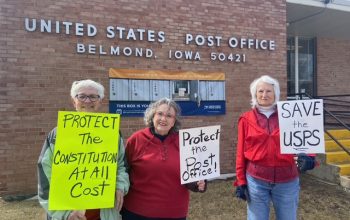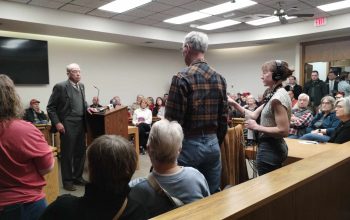Amanda Rink, Editor
April 18, 2025 – In a public meeting hosted at the Wright County Courthouse last week, state Representative Mark Thompson heard an urgent and unified message from local leaders: the proposed property tax overhaul working through the Iowa Legislature could devastate rural communities if approved without significant changes.
The discussion centered on House Study Bill 328 and Senate Study Bill 1227, proposals that would eliminate Iowa’s current “rollback” system for calculating taxable property value.
Instead, full taxation would be allowed on assessed value while limiting local governments to a 2% annual growth cap on tax revenues, with modest flexibility during inflationary periods.
Supporters say the bill is designed to rein in unpredictable tax hikes and provide relief for homeowners. But local officials and economic leaders warned that the measure, as written, fails to account for the real needs and constraints of rural Iowa.
“We are rural,” shared Melinda Anderson, President of the Clarion Development Alliance. “The state’s idea of rural is 15,000 to 20,000 people. We’re not even close to that. These changes could stop (our) growth in its tracks. But we want to grow, we need to grow.”
TIF Projects, Housing, and the Risk to Local Budgets- Much of the discussion focused on Tax Increment Financing (TIF), a tool widely used by counties to finance development projects. As Clarion City Administrator Clint Middleton put it, not many people understand TIF to its full extent. But under proposed legislation, many existing TIF agreements would lose revenue viability, putting major ongoing developments at risk.
Local economic officials shared their concerns that if the bills were to pass as written, housing projects, daycare partnerships, and even industrial parks could go “belly up,” with several attendees citing projects that rely on projected TIF revenues as collateral for development loans. They warned that a 30–40% cut in TIF income could force developers to renegotiate with banks or abandon projects entirely.
Equity, Inflation, and Legislative Whiplash – Participants voiced concerns over the inflation ranges built into the bills, which would allow revenue growth of 3–5% only if the Consumer Price Index (CPI) rises significantly, something they noted has averaged below 4% over the past decade.
One official suggested a fix, saying local governments should be allowed to grow revenue by 2%, plus CPI. “Don’t cap us at 2% including CPI; that math doesn’t reflect real-world costs,” the official said.
Others expressed frustration over how frequently Iowa’s property tax rules change, describing the difficulty of planning long-term infrastructure or staffing when rules shift year to year.
Several attendees remarked that it’s nearly impossible to build a five-year plan when legislation changes each session. One person compared it to trying to budget in a game where the rules are rewritten every time, referencing House File 718 as a recent example.
Rural-Urban Divide and Representation – Throughout the hour-long meeting, rural officials emphasized the mismatch between the needs of small communities and the assumptions in legislation shaped by what they consider urban districts.
One attendee pointed out that counties like Polk have vastly different tax bases and resource levels, noting that smaller towns are expected to provide the same services with fewer tools to raise revenue.
Some locals called for greater involvement of rural voices in the Ways and Means Committee, which constructs such tax bills. They suggested that the process would benefit from the direct participation of rural clerks, treasurers, and supervisors, not just representatives from urban centers like Des Moines.
Next Steps – Thompson, who is originally from the Eagle Grove area, assured locals he would take their feedback directly to House leadership. Although he is not a member of the tax-writing committee, he acknowledged the legislation’s issues.
“The number one thing I learned today was, don’t do it this year,” Thompson said. He considered the need to gather locals to speak with other officials at the Capitol, study the full impact of the bill, and be sure it works for all of Iowa.
As the legislation waits for subcommittee action, our local rural leaders left the meeting with cautious optimism and a shared hope that their voices won’t be drowned out in Capitol debate.


